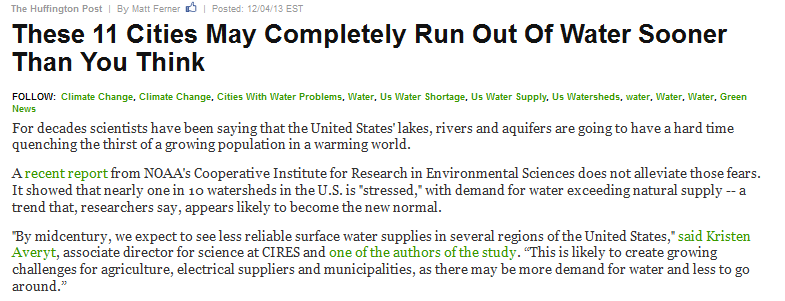When people hear the term “water crisis”, majority will automatically assume that there’s not enough water supply. However, a World Water Vision report clarifies that it’s not always about the supply, it can be “[a] crisis of managing water so badly that billions of people—and the environment—suffer badly.” Indeed, water scarcity is the result of poor water management.
In an article in the Huffington Post, Matt Ferner enumerates a few cities in the U.S. that might be facing water shortage crises over the next few years:
“Salt Lake City, UT – […] researchers found that for every degree Fahrenheit of warming in the SLC region, a 1.8 to 6.5 percent drop in annual water flow of local streams could occur.
Miami, FL – Miami’s watersheds appeared to be a relatively good shape in CIRES study […] however in 2012 the University of Florida listed the city as the second most at-risk for water vulnerability due to “low storage of water per capita.”
Washington D.C. – The D.C. metro area was ranked in the top 10 of the highest risk cities for water scarcity by Business Insider’s analysis of Columbia University’s water report.
San Francisco, CA – […] due to climate change, rising sea levels and earthquakes the region’s water could be severely disrupted, reduced or even infiltrated by sea water.”
The Danger
These are just four of the ten major cities listed in the article, and if you browse other sources you’ll find many more places that have declining freshwater levels, like Tucson, AZ, Las Vegas, NV, and Los Angeles, CA. Be it because of population boom, pollution, or climate change, water shortage is an impending danger that should not be ignored.
Storm Water Management
Many private companies and environmental organizations are trying to find a way to maintain sustainable water sources in problem areas like the ones mentioned above. One strategy they are implementing are storm water management systems such as StormChamber by firms like HydroLogic Solutions, Inc., which allow commercial and industrial establishments to effectively reuse storm water.
Conservation
Despite these large-scale efforts, you should never underestimate the power of efficient stormwater best management practices, even in the little things you do to conserve water. Take steps to ensure that your commercial establishment uses water efficiently and teach other people to do the same.
The unfortunate truth is that nowadays it is ingrained in human nature to spend resources rather than conserve them; so as society grows, much of what was once abundant dwindles and fades. However, this doesn’t mean that every person shouldn’t take steps towards conservation and restoration. Consider storm water management as the first step, and keep on moving forward.
(Source: These 11 Cities May Completely Run Out Of Water Sooner Than You Think, Huffington Post)






